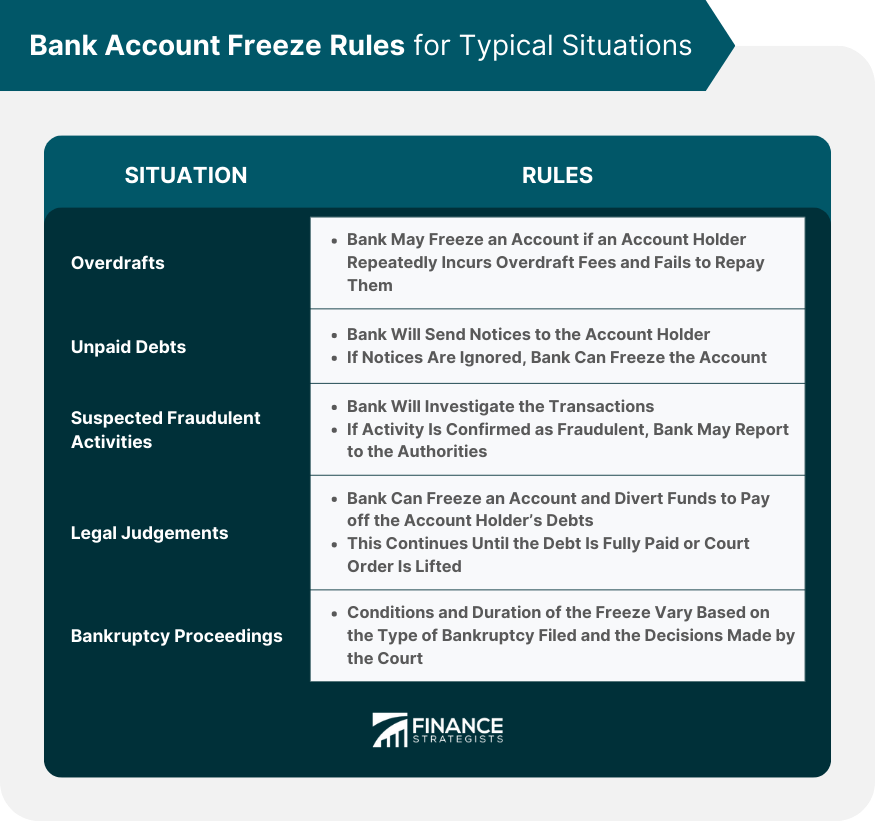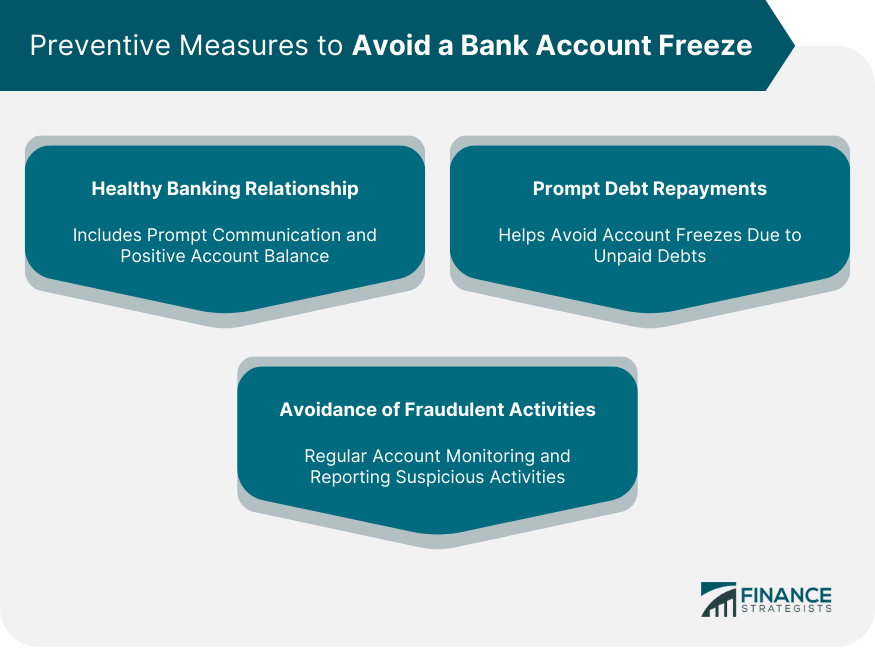Bank account freeze rules refer to legal and bank-specific regulations governing circumstances where an individual or business can't access funds in a bank account. These freezes can be triggered by various factors such as repeated overdrafts, unpaid debts, suspected fraudulent activities, legal judgments, or bankruptcy proceedings. When an account is frozen, it's usually after the bank has attempted to resolve the issue via notices or warnings. The freeze duration depends on the reason, and during this period, the account holder typically can't access their funds. However, account holders do have rights and can take steps to resolve the freeze, including negotiating with their bank or seeking legal assistance. Preventing account freezes involves managing your finances responsibly, promptly addressing account issues, and maintaining a healthy relationship with your bank. There are several legal provisions that govern bank account freezes. The specific rules can vary depending on jurisdiction, but most banks have the right to freeze accounts under certain conditions such as suspected fraudulent activity, unpaid debts, or in response to legal judgments. The most common situations that can lead to an account freeze include consistent overdrafts, unpaid debts, suspected illegal or fraudulent activity, legal judgments against the account holder, and bankruptcy proceedings. Banks often charge an overdraft fee when an account goes into the negative. While a single incident of overdraft is unlikely to trigger an account freeze, consistent overdrafts can. This is because habitual overdrafts can indicate financial instability and potential default risk to the bank. If an account holder repeatedly incurs overdraft fees and fails to repay them, the bank may ultimately decide to freeze the account. The specific number of allowed overdrafts before an account is frozen can vary from bank to bank. Banks have the legal right to freeze an account if the account holder has unpaid debts to the bank. This action is usually a last resort after the bank has attempted to recover the debt through normal collection processes. In case of unpaid debts, banks will first send several notices to the account holder. If these notices are ignored or if the account holder fails to make arrangements for repayment, the bank can opt to freeze the account. Typically, the account will remain frozen until the debt is repaid or a repayment plan is established. However, this duration can vary and is often contingent upon the individual's willingness and ability to resolve the debt. To protect consumers and comply with anti-money laundering laws, banks are required to monitor for suspicious activity. If a bank suspects fraudulent or illegal activity, it has an obligation to investigate and may freeze the account in question. Unusual transactions, such as large deposits or withdrawals, or transactions in locations not typical for the account holder, can trigger suspicion of fraudulent activity. In such cases, the bank may freeze the account while it conducts an investigation. During an account freeze due to suspected fraudulent activity, the bank will investigate the transactions. This can include contacting the account holder to verify transactions. If the activity is confirmed as fraudulent, the bank may take further action, such as reporting the activity to the authorities. Legal judgments against an account holder, such as those resulting from unpaid child support, tax debts, or court judgments for unpaid debts, can lead to an account freeze. In such cases, a court order will be issued directing the bank to freeze the account. Following a court order, a bank can freeze an account and divert funds to pay off the account holder's debts, a process known as garnishment. This continues until the debt is fully paid or the court order is lifted. Despite the freeze, account holders have certain rights. For instance, certain types of income, such as social security benefits, may be exempt from garnishment. Account holders can also contest the judgment or negotiate with the creditor. When an individual or business files for bankruptcy, their bank accounts can be frozen. This allows the court to take stock of the debtor's assets and ensure that creditors are paid as fairly as possible. The conditions and duration of the freeze depend on the type of bankruptcy filed and the decisions made by the court. However, it is not unusual for the freeze to last until the bankruptcy proceedings are complete. In the short term, an account freeze means the account holder cannot access their money. This can lead to bounced checks, unpaid bills, and financial hardship. In the long term, a freeze can impact the account holder's credit score and financial reputation, making it more difficult to secure loans or credit in the future. Even when an account is frozen, consumers have certain rights. For instance, they have the right to be notified of the freeze and the reason behind it. They also have the right to contest the freeze or negotiate for a resolution. To contest a freeze, consumers should first contact their bank to understand why the account was frozen. Next, they should gather any necessary documents or evidence that could help resolve the issue. If the freeze is due to a legal judgment, they may need to engage with the court or the creditor. Legal aid can play a significant role in resolving account freezes, particularly when they are due to legal judgments or bankruptcy proceedings. Lawyers specializing in consumer finance can provide guidance, help negotiate with creditors, or represent the consumer in court. Maintaining a healthy banking relationship involves keeping regular contact with the bank, promptly addressing any issues, and maintaining a positive account balance. It also involves managing any credit or loans responsibly and complying with the terms and conditions of the account. Making prompt debt repayments can prevent issues such as account freezes due to unpaid debts or legal judgments. It can also help maintain a good credit score, which can be beneficial for securing future credit. To avoid account freezes due to suspected fraudulent activity, consumers should monitor their accounts regularly, report any suspicious activity to their bank promptly, and take steps to protect their personal information. Bank account freeze rules are critical provisions that safeguard both the banking institution and the consumer. Key triggers for these freezes include habitual overdrafts, unpaid debts, suspected fraudulent activity, legal judgments, or bankruptcy proceedings. When a bank account is frozen, the repercussions can be immediate and far-reaching, often causing significant financial hardship for the account holder. Nevertheless, consumers have legal rights during these events and can take certain steps to contest the freeze or negotiate a resolution. Preventive measures, such as maintaining a healthy banking relationship, managing debts responsibly, and staying vigilant against fraud can help avoid the freezing of bank accounts. Ultimately, understanding these freeze rules can better equip individuals and businesses to navigate their financial journey with fewer roadblocks.Bank Account Freeze Rules Overview
Legal Grounds for Freezing a Bank Account
Laws Govern Bank Account Freezes
Typical Situations That Trigger a Bank Account Freeze
Bank Account Freeze Rules for Overdrafts
Overdraft Fees and Their Relation to Account Freezing
Bank's Policy for Freezing Accounts Due to Overdrafts
Bank Account Freeze Rules for Unpaid Debts
Overview of Bank's Rights in Case of Unpaid Debts
Mechanisms of a Freeze Due to Unpaid Debts
Duration and Conditions of a Freeze for Unpaid Debts
Bank Account Freeze Rules for Suspected Fraudulent Activity
Bank's Obligations in Case of Suspected Fraudulent Activity
How Fraudulent Activity Can Lead to Account Freeze
Procedures Followed in Case of a Freeze Due to Fraudulent Activity
Bank Account Freeze Rules for Legal Judgments
Understanding Legal Judgments That Can Lead to an Account Freeze
Explanation of the Garnishment Process
Rights of the Account Holder in Case of a Freeze Due to Legal Judgments
Bank Account Freeze Rules for Bankruptcy Proceedings
Legal Implications of Bankruptcy for a Bank Account
Conditions and Duration of a Freeze in Case of Bankruptcy Proceedings

Consequences of a Bank Account Freeze
Short-Term and Long-Term Implications of a Bank Account Freeze
Rights and Recourses for Consumers Facing a Bank Account Freeze
Legal Rights of Consumers During a Bank Account Freeze
Steps to Contest a Bank Account Freeze
Role of Legal Aid in Resolving Account Freeze Issues
Preventive Measures to Avoid a Bank Account Freeze
Tips for Maintaining a Healthy Banking Relationship
Importance of Prompt Debt Repayments
Strategies for Avoiding Fraudulent Activities

Conclusion
Bank Account Freeze Rules FAQs
A bank account freeze, or suspension, is when a bank restricts access to funds in a specific account. This can occur due to a variety of reasons such as consistent overdrafts, unpaid debts, suspected fraudulent activity, legal judgments against the account holder, or bankruptcy proceedings.
Yes, if an account holder repeatedly incurs overdraft fees and fails to repay them, the bank may ultimately decide to freeze the account. However, this is usually a last resort after the bank has attempted to contact the account holder and resolve the overdraft issue.
If your account is frozen due to unpaid debts, you have the right to be notified about the freeze and the reason behind it. You can contact your bank to discuss repayment plans or consult with legal aid for further actions.
Preventing a bank account freeze involves maintaining a healthy banking relationship. This includes promptly addressing any issues with your account, avoiding repeated overdrafts, making sure any debts or loans are managed responsibly, and protecting your account from fraudulent activities.
The length of a bank account freeze can vary widely and depends on the reason for the freeze. For instance, in case of suspected fraudulent activity, the freeze may last until the bank completes its investigation. For unpaid debts or legal judgments, the freeze might last until the debt is repaid or a court order is lifted. In the case of bankruptcy, the freeze can last until the proceedings are complete.
True Tamplin is a published author, public speaker, CEO of UpDigital, and founder of Finance Strategists.
True is a Certified Educator in Personal Finance (CEPF®), author of The Handy Financial Ratios Guide, a member of the Society for Advancing Business Editing and Writing, contributes to his financial education site, Finance Strategists, and has spoken to various financial communities such as the CFA Institute, as well as university students like his Alma mater, Biola University, where he received a bachelor of science in business and data analytics.
To learn more about True, visit his personal website or view his author profiles on Amazon, Nasdaq and Forbes.











